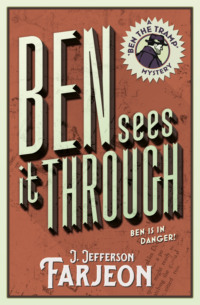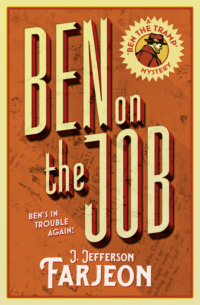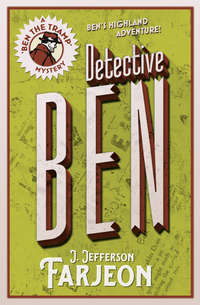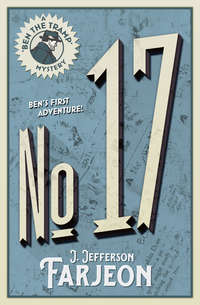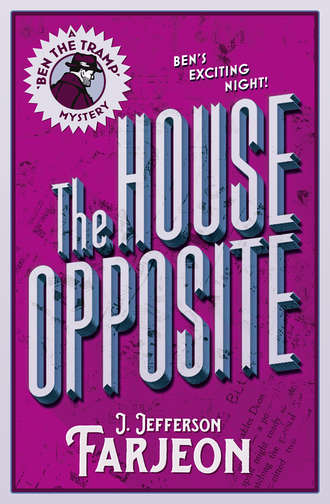
Полная версия
The House Opposite
‘Fer my good, eh?’ queried Ben, ‘Meanin’ yer love me, cocky?’
Now something did enter the Indian’s expression. A sudden flash, like the glint of a knife. But it was gone in an instant.
‘You are nothing,’ said the Indian.
‘And so are you, with knobs on!’ barked Ben, and slammed the door.
He had made a brave show, if not a wise one, but as soon as the door was closed he was seized with a fit of trembling. He backed to the stairs, and sat down on the bottom step. He wondered if the Indian was still standing outside, or whether he was walking away? He wondered whether he would really go for the police, and, if so, why? He wondered whether he had really shut him out? Indians were slippery customers, climbing up ropes that weren’t there and what not, and perhaps this one knew a trick or two, and could duck into a house when the door was slammed on him! He might be in the shadows, now. He might have sprung by Ben, and have got on to the stairs. He might be behind Ben, at this moment, bending over him with a knife poised to prick his neck!
‘Gawd!’ gasped Ben, and leapt to his feet.
Nobody was on the staircase. Only shadows. It occurred to Ben that he had better go up himself, before his knees gave out. He went up, shakily. ‘’Ow I ’ate Injuns!’ he muttered. When he got back to his room, he sat down on the soap box, and thought.
Of course, he had only been putting up a bluff. The wise thing to do would be to leave at once. Yes, even though the weather was getting worse and worse, and darkness was settling on the streets, choking out all their kindliness. Even though the wind was rising, still you didn’t know whether it was the wind or a dog, and the creaking ran up and down your spine.
‘Wot I can’t mike out,’ blinked Ben, ‘is wot I come up orl these stairs agin for at all!’
Perhaps it was for his cap! Yes, one might as well keep one’s cap. He took it from under him. He had used it as a cushion. Then, dissatisfied with himself, and life, and the whole of God’s plan, he crept from the room and out into the passage.
‘If on’y it wasn’t fer that there creakin’!’ he muttered.
Creak! Creak! The house seemed to have become populated with creaks! Perhaps he was making them himself? He paused, on the top stair. The creaks went on. Creak! Creak! Below him. And, once, a sort of slither. Like someone coming in through a window … A window! A back window! A back window that had been left open!
Ben had been standing on the top stair. Now he found himself sitting on it. His knees had given out.
There was no mistake about it! Someone had got in through the back window! Those creaks were not the mere complaint of a dying house. They were not just the moaning of bricks or the cracking up of decayed wood. Life was causing those creaks—life forming contact with death—movement outraging the static! In the more simple language that shames metaphor, someone was coming up.
‘’Ere—wotcher doin’?’ gasped Ben to himself.
He caught hold of the rotting banister and heaved himself up. The banister just held. Then he sped back into his room, and waited.
He waited with his eyes on the door. The door was half-open, and he did not close it because, had he done so, he could only have followed the creaks in his imagination, and they could have ascended to the door without his knowing it. Now, at least, he could listen to them, in the hope that they would come no closer …
They came closer. Now they were on the lower stairs. Now a slight change in their character indicated the passage on the first floor. Hallo! They had stopped! What did that mean? Hallo; they hadn’t stopped! Where were they? Something was wrong somewhere …
Something sounded immediately below him. First floor front! That’s where they were! Gone in! To look for him!
Should he make a dash for it? If he was nippy he might get down the stairs, and then make a bunk for the back window below! Yes, if he was nippy …
He jerked himself towards the half-open door. Then he stopped. He was too late. The creaks had started again. They were now on the last staircase. Creak! Creak!
‘I know!’ thought Ben. ‘I’ll ’it ’im!’
He stood, galvanised. The creaks reached the landing. They reached the door. The door began to open …
3
Ben Accepts a Job
SHOCKS have an inconsiderate habit of getting you both ways. If you expect a parson and receive a cannibal, or if you expect an Indian and receive a beautiful girl, the world spins round, just the same. What you really need is a nice quiet life, with breakfast, dinner and tea, and ordinary things in between.
The beautiful girl who provided Ben with his present shock, and made him go all weak like, seemed quite as surprised to see Ben as he was to see her. There was, at least, equality of emotion, and that was something. Moreover, as he stared at her with mouth wide open (Ben never did his mouth by halves) and an exhibition of teeth that could not hold their own beside those she herself displayed, he began to discover certain other compensations in the situation. Item, her eyes. They really were rather a knock-out. The kind of eyes that made you feel sort of … Item, her hair. You couldn’t see much of it because of the natty little helmet hat she was wearing, but what you could see was good. Item, her nose. Now there was a nose fit for anybody! Item, her mouth, and the teeth that put Ben’s incomplete army in the shade … Yes, as he stared at her and she, framed in the doorway, stared back, he realised that the world could spin quite agreeably.
Still, one couldn’t stand staring all one’s life! What was she doing here? But it was the girl who recovered first and opened the attack.
‘Who are you?’ she demanded.
Ben spent half his life telling inquisitive people who he was, and he had a large assortage of answers. He had confessed to being everybody under the sun, from Lloyd George to Tom Thumb. But he did not think in the present circumstances he could improve on the answer he had given to his two other callers, so he murmured: ‘Caretaker, miss.’ And hoped for the best.
‘What—are you the caretaker of this house?’ exclaimed the girl, with unflattering incredulity.
‘That’s right,’ blinked Ben. ‘No. 29 Jowle Street.’
He would prove he knew the number, anyway.
‘I see—it’s to let,’ said the girl slowly.
‘Yus,’ nodded Ben solemnly. ‘But you better not tike it.’
‘Why not?’
‘Carn’t yer see? Comin’ ter bits. Look at that there plarster!’
He pointed to the ceiling. The girl smiled. Yes, her teeth were winners, and no mistake! Like rows of little gravestones. Noo ones, o’ corse …
‘If you’re really the caretaker here,’ she observed, ‘you’re not doing your duty very well. You oughtn’t to run the place down.’
‘It don’t need me to,’ retorted Ben. ‘It does it itself.’
‘I—I suppose you really are the caretaker?’
Ben looked uncomfortable. He hated having to repeat things.
‘Why not?’ he hedged. ‘Come ter that, miss, one might arsk ’oo you was, comin’ in like this?’
‘One might,’ she agreed, without hesitation.
‘Yus—and torkin’ o’ that—’ow did yer come in?’ inquired Ben suddenly.
‘I came in through an open window at the back,’ she responded. ‘Like you.’
‘Like me?’
‘Yes.’
Ben capitulated.
‘Oh, orl right,’ he grunted. ‘But it’s fifty-fifty, so we ain’t got nothin’ on each hother.’
‘No,’ smiled the girl. ‘We both came in to get out of the rain!’
‘Oh rainin’, is it?’ murmured Ben. ‘Well, that’s an idea.’
Yes, it was an idea for him. But was it an idea for her? He regarded her dubiously, and an uneasy suspicion came into his mind that she wasn’t playing fair. She had caught him up in a fib—made him admit it—and it looked as though she were fibbing herself!
Still, p’r’aps it didn’t matter. It really wasn’t Ben’s affair, and there is something human about a fib, so long as it doesn’t hurt you. What mattered was that she was here and he was here, and the sooner they both cleared out, the better.
‘Well, tike my advice, miss,’ said Ben, returning to first principles, ‘and git aht agin, like I’m goin’ ter.’
‘But the rain—’ she began.
Unceremoniously, he waved her down.
‘Yus, I knows orl abart that, miss,’ he interposed; ‘but I knows somethin’ helse, as well.’
‘What?’
‘Why, that fer orl the rine, yer more likely ter catch something’ in ’ere than aht there.’
Now the girl frowned.
‘I wish you wouldn’t be so mysterious,’ she exclaimed. ‘Won’t you tell me what you mean exactly?’
‘Well,’ answered Ben, after a pause, ‘I don’t wanter frighten yer, see, but this ’ouse ain’t ’ealthy.’
‘What makes you say that?’ Her voice was interested.
‘Creaks and things.’ He was evading the issue. He really didn’t want to frighten her. He knew what fright was. ‘You know. On the stairs. Cupboards and that. You know.’
He wasn’t doing it very well.
‘I’m afraid I don’t know,’ replied the girl, her interest waning. ‘Creaks don’t worry me.’ Ben looked incredulous. ‘I don’t believe in ghosts. Still, if you do, you’d better go. I won’t keep you.’
What? Him go, and her stay? All the manhood in him—and he had a spoonful—rebelled against the suggestion. What would he feel like tomorrow morning when he read in the headlines:
EMPTY HOUSE MYSTERY
BEAUTIFUL GIRL FOUND WITH
THROAT CUT
AND HOARYENTAL KNIFE
IN CHEST
The words were bad enough as they stood up in his imagination. He knew that, if he had to face them in reality, cheese would never taste the same again.
‘Orl right, miss, if yer will ’ave it,’ he muttered. ‘It ain’t the creaks wot’s sendin’ me away. It’s a blinkin’ Injun.’
Now her interest flared up again, and Ben stared at her in amazement.
‘Wot? Do you ’ate Injuns, too?’ he asked sympathetically. ‘Fair gits on my nerves, they does. And this ’un’s the worst I hever come acrost, with ’is slimy manners, and sayin’ good evenin’ to yer in the sort o’ perlite voice wot really means, “I’d like ter stick a knife in yer gizzard,” if yer git me.’
‘But—do you really mean,’ she demanded, ‘that an Indian has been here?’
‘Yus.’
‘In this house?’
‘Ain’t I tellin’ yer? ’E comes ’ere, like as if ’e owned the blinkin’ plice—the plice, that is—and tells me ter ’op it or somethin ’ll ’appen to yer. ’Oo do yer think yer are? I ses. Oh, I give ’im a bit o’ back chat. But—well, there y’are,’ he ended up rather lamely. ‘’E kep’ on as if ’e meant it. So yer see, miss, if it ain’t safe fer me ter stop, it ain’t no more fer you.’
But the girl made no sign of moving. Instead she looked into the bare room, beyond the packing case, to the window. And her eyes remained on the window.
‘Have you any idea why he wanted you to go?’ she asked.
‘No, miss.’
‘Or—where he is now?’
Ben looked a little uneasy.
‘I thort fust as ’ow ’e was still ’ere,’ he answered; ‘but I reckon now ’e’s gorn right enuff.’
‘And you can’t say where?’ she repeated.
‘Well, if ’e’s gorn ter the ’ouse oppersit, where yer lookin’ at, miss, ’e’s a mug.’
She turned away from the window quickly, and her eyes were now on Ben again.
‘Why should he have gone to the house opposite?’ she demanded. ‘And, if he has, why is he—a mug?’
‘Look ’ere, miss,’ said Ben seriously, ‘orl this ain’t got nothin’ ter do with me and you, ’as it? I dunno where old Rangysinjy’s gorn, orl I know is I ’ope it’s a long way, and the reason I sed ’e’d be a mug ter go in the ’ouse oppersit is ’cos the ’ouse oppersit ain’t much better’n this ’un, ter my thinkin’, not with people pertendin’ ter be dead—lyin’ dahn, I seen ’em, and coffins bein’ derlivered there in carts like stop-me-and-buy-one. And now, fer Gawd’s sake, let’s be goin’, ’cos lummy I’ve ’ad enuff of it, that’s a fack.’
He stopped to breathe. It was rather a long speech. The girl looked at him intently.
‘I’m grateful to you for all your information,’ she said; ‘but if you want to go, I’m still not keeping you.’
‘Yus, you are,’ retorted Ben.
‘How?’
‘By not gettin’ a move on. I ain’t’ goin’ afore you do.’
‘Why not?’
Ben’s expression grew hurt.
‘Well, p’r’aps I ain’t much ter look at,’ he murmured, ‘but Napoleon wasn’t seven foot!’
The remark, as well as the manner of it, made an impression. She regarded him more intently still.
‘I believe I’ve been underrating you all this while, Napoleon,’ she said, ‘and I believe you underrate yourself.’
‘’Oo?’ he blinked.
He wasn’t quite sure of ‘underrate’, but he felt there was a compliment somewhere, and it confused him.
‘I don’t believe you’re half as scared as you say you are,’ she went on, simplifying it.
Ben considered the point. He tried to agree, but couldn’t.
‘There’s times, miss,’ he responded, with an outburst of frankness, ‘when jellies ain’t in it.’ He misread her smile, and tried to save himself a little. ‘Lorst me nerve, miss, in the war—thinkin’ I was goin’ ter be called up.’
‘Just the same, I’m going to stick to my opinion, Napoleon,’ she insisted, ‘and, what’s more, I’m going to test it. You say you won’t go if I stay. Will you stay if I go?’
Ben’s eyes became big.
‘Wot’s that?’ he jerked.
‘As my caretaker,’ she added. ‘Wages in advance.’
Ben’s eyes became bigger as she opened her bag and laid a pound note on the packing case.
‘Wot—is this your ’ouse?’ he gasped.
‘If you accept the offer, perhaps you could keep an eye on my view for me?’ she suggested.
She returned to the window as she spoke. For a few seconds Ben gaped at her, and he had not found his voice before she suddenly darted back from the window again.
‘I must go!’ she exclaimed. Her voice was tense, and she was at the door in a flash. But at the door she paused for an instant, and her eyes grew worried. ‘Don’t accept my offer, Napoleon,’ she said. ‘It was thoughtless of me—I shouldn’t have made it.’
Then she vanished. He heard her flying down the stairs. The rustle of her clothes grew more and more distant. A moment’s utter silence. The slamming of a door. Utter silence again.
‘Don’t tike ’er hoffer, eh?’ murmured Ben.
He removed his eyes from the doorway to the soap box, on which lay the pound note. Then he removed his eyes from the soap box back to the doorway.
‘Nobody couldn’t tike this job from me,’ he observed solemnly, ‘not with a red-’ot poker!’
His words echoed out into the passage. And the passage seized them, turned them into hollow sounds, and sent them mockingly down the stairs.
4
At the Coffee Stall
BEN did not move for five minutes after the front door slammed and the dream had passed out of it, leaving only the nightmare behind. He wanted to try and work things out, and you could only do that when you kept quite still.
This girl, now, to begin with. What about her? She was a stunner, all right. Do for a queen anywhere, or p’r’aps more a princess like. The kind of girl he’d have liked his little kid to have growed up into, if she’d growed up at all … Just the same, there was something rum about her. First saying she’d come in to get out of the rain. And, afterwards, it being her house, all the time.
‘Yus, but if it’s ’er ’ouse, wot she wanter come in through the winder for?’ wondered Ben. ‘Don’t they ’ave latch-keys?’
There you were, you see! There was something rum about her! You always got a latch-key with a house. Suppose it wasn’t her house?
‘Well, if it ain’t ’er ’ouse, it don’t mike no dif’rence,’ Ben retorted to himself. ‘I’ll bet she ain’t a wrong ’un, although I’ve knowed wrong uns afore wot couldn’t ’elp it. Any’ow, there’s ’er pahnd, and ’ere am I, and I’ve took on the job!’
So that was that. Next?
Next, the Indian. What about him? It was quite impossible to formulate any definite theory about him, either, but two points emerged uncomfortably from thought. First, would he come back to find out if Ben had left? Second, was he still here, waiting for Ben to go?
‘Lummy!’ murmured Ben, and decided to try and forget this for a moment or two. You see, when you started thinking about the Indian he got hold of your mind like an octopus and wouldn’t let you think of anything else.
And there were other things to think about. That first chap who had called. What about him? And the funny going’s on at No. 29. What about them? And …
Ben’s eyes began to roam towards the window, and paused at the wooden case with the note still lying on it.
Yes—and the pound. What about that?
And now a wonderful idea dawned in Ben’s mind, as the outcome of all these cogitations. If he was going to dig himself in here for the night, he would have to go out and buy a few things. It might even be a good idea to try and find a Lockhart’s and stoke up. Why not use this occasion to fool the Indian, making him believe that Ben’s temporary departure was a permanent one?
‘Blimy, there’s a clever idea!’ thought Ben, rendered solemn by his own ingenuity. ‘She called me Napoleon—I reckon she was right!’
He worked it all out carefully, just as Napoleon would have done. Say the Indian was away, but returned? He’d find the house empty, and would be satisfied. Say he wasn’t away, but heard Ben leave? Same thing, wasn’t it? Especially if Ben talked a bit to himself, to add a little local colour like?
Yes, that was the plan! Now to put it into operation! He stepped to the packing case, and secured the pound.
‘Gawd—a pahnd!’ he exclaimed suddenly. ‘A ’ole blinkin’ pahnd!’
It was the first time he had fully realised it. Turn that into cheese, and it’d take some carrying!
Yes, but suppose the girl returned, and found him gone? Him and the pound? What’d she think? Ben did not want to risk her bad opinion.
To avoid the risk he fished a scrap of paper from his pocket. It was a nice bit, the best bit he’d got. Only two thumb-marks. Still; she was worth it. From another pocket he fished out a pencil stump. This wasn’t quite so impressive. They give you rotten pencils at the post office. Then, after thinking for a full minute of the best way to convey the idea on paper that he was coming back, he gave the lead a lick and wrote:
‘COMIN BACK.’
He laid the paper on the wooden case, where the pound note had been. If she returned she’d be sure to find it …
‘Yus, but if the Injun returns, ’e’ll find it, too!’ thought Ben, with a shock.
A bad mark for Napoleon, that! He sweated, to realise how nearly he had cooked his own goose. What a mug he was!
But the next instant he was smiling again. He needn’t waste the paper. He’d use it to cheat the Indian further. He added a word to the message, and now it read:
‘AINT COMIN BACK.’
He chuckled as he read the amended version, and continued to chuckle all the way out to the passage. Then the chuckling stopped abruptly.
‘Yus, but s’pose, arter all, the Injun don’t return, and the gal does?’
He turned and re-entered the room. He tore the paper to little bits, and threw them on the floor. Then he picked all the little bits up, and threw them out of the window. He realised that, after all, he wasn’t quite cut out for a general.
Nevertheless, he did not scrap his entire plan of campaign, and when he reached the passage again and began to descend the stairs he remembered to pretend to be frightened, so that the Indian, if he were watching through any of the cracks, would believe he was being scared out of the house. He did not find the pretence in the least difficult. His first ‘Ah’ of simulated fear was so realistic that it sent him sliding down half a flight. It would have been a full flight but for a turn.
‘Gawd!’ muttered Ben, almost tearfully. ‘I wish I ’ad ’old of the feller wot invented hechoes!’
He rose, and decided that his future demonstrations would be more quiet like. He began to mutter.
‘Well, arter orl, wot’s the good o’ stayin’?’ he asked. ‘It’s a rotten ’ouse, any’ow, and if the Injun wants it, ’e can ’ave it. I’ve ’ad enuff of it. I’m goin’ away, and I ain’t never comin’ back, never, not so long as I live!’
That ought to do it. Still, just to make perfectly certain, he added:
‘I reckon yer wouldn’t git me back ’ere not if King George ’iself was ter come up ter me and ter say, “Ben, won’t yer?”’
There! If the Indian didn’t believe him after that, he must be a fool!
Satisfied with his effort, Ben reached the front door and opened it cautiously. It was not quite dark yet, but a vague drizzle still filled the air and merged into the indeterminate mist. Not at all pleasant outside. But then it wasn’t at all pleasant inside, either. Life is largely a matter of comparisons, and the outside of No. 29 Jowle Street didn’t have to exert itself seriously to secure the advantage.
Before leaving the doubtful sanctuary of No. 29, Ben looked across the road at No. 26. If anybody had popped out of No. 26 at that moment, he might have popped back into No. 29. No. 26 was already beginning to get upon his nerves and to exert an hypnotic influence over him. His mind was constantly drawn there. He hoped that his body would never be. But, happily, no one popped out at this particular moment, and, closing the door behind him, Ben slipped out into the road.
And now, for a few moments, he became a very different creature from the hesitating Ben we have known. He moved like lightning, having a remarkable ability in that direction when necessity arose. The necessity just now was simply the necessity of getting out of Jowle Street before Jowle Street saw him, as it were. That, and a sudden longing for the company of a cup of tea.
Already Jowle Street lay three streets away. You couldn’t get back there by one move of the chess-board, not even if you were a knight. Ben breathed a little more freely. What about not going back at all? Yes, why go back? With a pound in his pocket to spend, and …
Ah, but was the pound his to spend if he didn’t go back? There was the catch!
Three more corners; round two of them; and now a light streaked across the road. It came from the window of a shop outside which stood a stout man mechanically exhorting passers-by to purchase bacon before closing-time. ‘Where bacon goes, cheese follers’ was one of Ben’s guides to existence. Ruth and Naomi were not more inseparable. He veered across to the stout man, and demanded cheddar.
The stout man cut him a slab, and held it out to him.
‘Where’s the piper?’ demanded Ben.
‘You don’t want any paper,’ answered the stout man, with a grin.
‘’Ow am I goin’ ter write my letters ternight?’ retorted Ben. ‘Churchill’s waitin’ ter ’ear from me.’
The stout man laughed. He wasn’t really unkind. He did the cheese up in a beautiful parcel, while Ben counted out his change, to make sure he hadn’t received too many coins.
Along another street was a coffee stall. Ben made a bee-line for this when he spotted it, and life eased out.
‘Cup o’ tea,’ he ordered. ‘Big ’un!’
Then he nearly jumped out of his skin. The Indian was standing next to him.
‘Good evening,’ said the Indian.
Ben gulped. He wasn’t quite ready for the courtesies.
But the Indian betrayed no annoyance over his lack of them. He continued amiably:
‘You are out for a walk?’
Ben recovered himself, and answered:
‘No. I’m surf-ridin’.’
The Indian smiled. So did the coffee stall keeper. The coffee stall keeper’s smile was ever so much the nicer.


